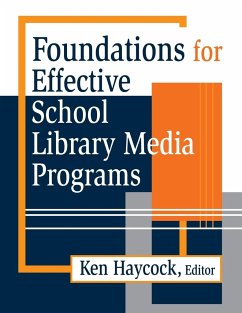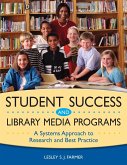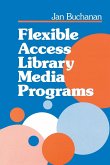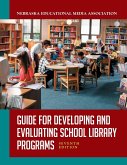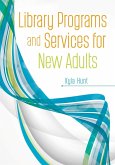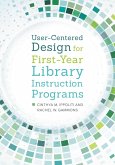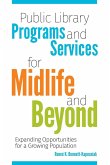Ken Haycock
Foundations for Effective School Library Media Programs
Ken Haycock
Foundations for Effective School Library Media Programs
- Broschiertes Buch
- Merkliste
- Auf die Merkliste
- Bewerten Bewerten
- Teilen
- Produkt teilen
- Produkterinnerung
- Produkterinnerung
How can you make your school library media program more successful? This timely book identifies current trends and thinking about library media specialists as change agents and their roles in school improvement, curriculum design, collaboration with teachers, and building information literacy. Reprinted from recent issues of Emergency Librarian, 39 enlightening and exciting articles offer stimulating discussions on learning theories, flexible scheduling, new technologies, thematic units, new partnerships, and more. Articles are organized into seven sections: foundations, the school context,…mehr
Andere Kunden interessierten sich auch für
![Student Success and Library Media Programs Student Success and Library Media Programs]() Lesley FarmerStudent Success and Library Media Programs62,99 €
Lesley FarmerStudent Success and Library Media Programs62,99 €![Flexible Access Library Media Programs Flexible Access Library Media Programs]() Jan BuchananFlexible Access Library Media Programs43,99 €
Jan BuchananFlexible Access Library Media Programs43,99 €![Guide for Developing and Evaluating School Library Programs Guide for Developing and Evaluating School Library Programs]() Nebraska Educ Media AssocGuide for Developing and Evaluating School Library Programs55,99 €
Nebraska Educ Media AssocGuide for Developing and Evaluating School Library Programs55,99 €![Library Programs and Services for New Adults Library Programs and Services for New Adults]() Kyla HuntLibrary Programs and Services for New Adults55,99 €
Kyla HuntLibrary Programs and Services for New Adults55,99 €![User-Centered Design for First-Year Library Instruction Programs User-Centered Design for First-Year Library Instruction Programs]() Cinthya IppolitiUser-Centered Design for First-Year Library Instruction Programs70,99 €
Cinthya IppolitiUser-Centered Design for First-Year Library Instruction Programs70,99 €![Public Library Programs and Services for Midlife and Beyond Public Library Programs and Services for Midlife and Beyond]() Renee Bennett-KapusniakPublic Library Programs and Services for Midlife and Beyond72,99 €
Renee Bennett-KapusniakPublic Library Programs and Services for Midlife and Beyond72,99 €![Crash Course in Library Gift Programs Crash Course in Library Gift Programs]() Ann RobertsCrash Course in Library Gift Programs55,99 €
Ann RobertsCrash Course in Library Gift Programs55,99 €-
-
-
How can you make your school library media program more successful? This timely book identifies current trends and thinking about library media specialists as change agents and their roles in school improvement, curriculum design, collaboration with teachers, and building information literacy. Reprinted from recent issues of Emergency Librarian, 39 enlightening and exciting articles offer stimulating discussions on learning theories, flexible scheduling, new technologies, thematic units, new partnerships, and more. Articles are organized into seven sections: foundations, the school context, role clarification, information literacy, collaborative planning and teaching, program development, and accountability. Essential professional reading, this book can also be used as a school media textbook in library schools.
Hinweis: Dieser Artikel kann nur an eine deutsche Lieferadresse ausgeliefert werden.
Hinweis: Dieser Artikel kann nur an eine deutsche Lieferadresse ausgeliefert werden.
Produktdetails
- Produktdetails
- Verlag: Libraries Unlimited
- Seitenzahl: 346
- Erscheinungstermin: 15. April 1999
- Englisch
- Abmessung: 280mm x 216mm x 19mm
- Gewicht: 872g
- ISBN-13: 9781563083686
- ISBN-10: 156308368X
- Artikelnr.: 21429466
- Herstellerkennzeichnung
- Libri GmbH
- Europaallee 1
- 36244 Bad Hersfeld
- gpsr@libri.de
- Verlag: Libraries Unlimited
- Seitenzahl: 346
- Erscheinungstermin: 15. April 1999
- Englisch
- Abmessung: 280mm x 216mm x 19mm
- Gewicht: 872g
- ISBN-13: 9781563083686
- ISBN-10: 156308368X
- Artikelnr.: 21429466
- Herstellerkennzeichnung
- Libri GmbH
- Europaallee 1
- 36244 Bad Hersfeld
- gpsr@libri.de
Ken Haycock, EdD, is research professor of management and organization at the University of Southern California, where he directs the Center for Library Leadership and Management.
Contributors Introduction Part One: The Foundations Chapter 1:
Strengthening the Foundations for Teacher-Librarianship Chapter 2: Research
in Teacher-Librarianship and the Institutionalization of Change Part Two:
The School Context Chapter 3: Leadership for School Improvement Chapter 4:
The School Library Program and the Culture of the School Chapter 5:
Libraries, Learning and the Whole School Part Three: Role Clarification
Chapter 6: The School Librarian as a Professional Teacher Chapter 7:
Navigating the '90's - The Teacher-Librarian as Change Agent Chapter 8:
Developing Information Literacy Through the Information Intermediary
Process Chapter 9: Teacher-Librarians: Mirror Images and the Spark Chapter
10: Students' Information Literacy Needs: Competencies for
Teacher-Librarians in the Twenty-First Century Part Four: Informaton
Literacy Chapter 11: Information Literacy in an Information Society Chapter
12: Media Literacy: The New Basic-Will the Real Curriculum Please Stand Up?
Chapter 13: Student Access to the Internet: Librarians and Teachers Working
Together to Teach Higher Level Survival Skills Chapter 14: Misinformation
on the Internet: Applying Evaluation Skills to Online Information Chapter
15: Information Skills in the Curriculum: Developing a School-Based
Curriculum Chapter 16: Developing a School-Based Research Strategy K-7
Chapter 17: Computer Literacy and Information Literacy: A Natural
Combination Chapter 18: All That Glitters May Not Be Gold Part Five:
Collaborative Planning and Teaching Chapter 19: Curriculum Encounters of
the Third Kind: Teachers and Teacher-Librarians Exploring Curriculum
Potential Chapter 20: The School Librarian and the Classroom Teacher:
Partners in Curriculum Planning Chapter 21: Changing Teaching Practice to
Meet Current Expectations: Implications for Teacher-Librarians Chapter 22:
Expanding the Collaborative Planning Model Chapter 23: Collaborative
Planning: A Model That Works Part Six: Program Development: A Systemic
Approach Chapter 24: Developing the School Resource Center Program: A
Developmental Approach Chapter 25: From Library Program to Learning
Resources Program: Cooperative Program Planning and Teaching Chapter 26:
Prerequisites to Flexible Scheduling Chapter 27: Secondary School
Assignments: Cooperatively Planned and Taught Chapter 28: A Stations
Approach to Learning: The Conversation of a Secondary School Skeptic
Chapter 29: Connecting Writing and Research Through the I-Search Paper: A
Teaching Partnership Between the Library Program and Classroom Chapter 30:
Designing Thematic Literature Units Chapter 31: What Do You Believe About
How Culturally Diverse Students Learn? Chapter 32: Principals and
Teacher-Librarians: A Study and a Plan for Partnership Chapter 33:
Communication Skills and Strategies for Teacher-Librarians Part Seven:
Accountability Chapter 34: School Libraries - Definitely Worth Their Keep
Chapter 35: Using Evaluation to Bring School Library Resrouce Center
Programs into Closer Alliance with Information Power Chapter 36:
Evaluation: The Key to Growth Chapter 37: Evaluation of the
Teacher-Librarian: A Discussion Guide Chapter 38: Theory - Where is My
Reality?
Strengthening the Foundations for Teacher-Librarianship Chapter 2: Research
in Teacher-Librarianship and the Institutionalization of Change Part Two:
The School Context Chapter 3: Leadership for School Improvement Chapter 4:
The School Library Program and the Culture of the School Chapter 5:
Libraries, Learning and the Whole School Part Three: Role Clarification
Chapter 6: The School Librarian as a Professional Teacher Chapter 7:
Navigating the '90's - The Teacher-Librarian as Change Agent Chapter 8:
Developing Information Literacy Through the Information Intermediary
Process Chapter 9: Teacher-Librarians: Mirror Images and the Spark Chapter
10: Students' Information Literacy Needs: Competencies for
Teacher-Librarians in the Twenty-First Century Part Four: Informaton
Literacy Chapter 11: Information Literacy in an Information Society Chapter
12: Media Literacy: The New Basic-Will the Real Curriculum Please Stand Up?
Chapter 13: Student Access to the Internet: Librarians and Teachers Working
Together to Teach Higher Level Survival Skills Chapter 14: Misinformation
on the Internet: Applying Evaluation Skills to Online Information Chapter
15: Information Skills in the Curriculum: Developing a School-Based
Curriculum Chapter 16: Developing a School-Based Research Strategy K-7
Chapter 17: Computer Literacy and Information Literacy: A Natural
Combination Chapter 18: All That Glitters May Not Be Gold Part Five:
Collaborative Planning and Teaching Chapter 19: Curriculum Encounters of
the Third Kind: Teachers and Teacher-Librarians Exploring Curriculum
Potential Chapter 20: The School Librarian and the Classroom Teacher:
Partners in Curriculum Planning Chapter 21: Changing Teaching Practice to
Meet Current Expectations: Implications for Teacher-Librarians Chapter 22:
Expanding the Collaborative Planning Model Chapter 23: Collaborative
Planning: A Model That Works Part Six: Program Development: A Systemic
Approach Chapter 24: Developing the School Resource Center Program: A
Developmental Approach Chapter 25: From Library Program to Learning
Resources Program: Cooperative Program Planning and Teaching Chapter 26:
Prerequisites to Flexible Scheduling Chapter 27: Secondary School
Assignments: Cooperatively Planned and Taught Chapter 28: A Stations
Approach to Learning: The Conversation of a Secondary School Skeptic
Chapter 29: Connecting Writing and Research Through the I-Search Paper: A
Teaching Partnership Between the Library Program and Classroom Chapter 30:
Designing Thematic Literature Units Chapter 31: What Do You Believe About
How Culturally Diverse Students Learn? Chapter 32: Principals and
Teacher-Librarians: A Study and a Plan for Partnership Chapter 33:
Communication Skills and Strategies for Teacher-Librarians Part Seven:
Accountability Chapter 34: School Libraries - Definitely Worth Their Keep
Chapter 35: Using Evaluation to Bring School Library Resrouce Center
Programs into Closer Alliance with Information Power Chapter 36:
Evaluation: The Key to Growth Chapter 37: Evaluation of the
Teacher-Librarian: A Discussion Guide Chapter 38: Theory - Where is My
Reality?
Contributors Introduction Part One: The Foundations Chapter 1:
Strengthening the Foundations for Teacher-Librarianship Chapter 2: Research
in Teacher-Librarianship and the Institutionalization of Change Part Two:
The School Context Chapter 3: Leadership for School Improvement Chapter 4:
The School Library Program and the Culture of the School Chapter 5:
Libraries, Learning and the Whole School Part Three: Role Clarification
Chapter 6: The School Librarian as a Professional Teacher Chapter 7:
Navigating the '90's - The Teacher-Librarian as Change Agent Chapter 8:
Developing Information Literacy Through the Information Intermediary
Process Chapter 9: Teacher-Librarians: Mirror Images and the Spark Chapter
10: Students' Information Literacy Needs: Competencies for
Teacher-Librarians in the Twenty-First Century Part Four: Informaton
Literacy Chapter 11: Information Literacy in an Information Society Chapter
12: Media Literacy: The New Basic-Will the Real Curriculum Please Stand Up?
Chapter 13: Student Access to the Internet: Librarians and Teachers Working
Together to Teach Higher Level Survival Skills Chapter 14: Misinformation
on the Internet: Applying Evaluation Skills to Online Information Chapter
15: Information Skills in the Curriculum: Developing a School-Based
Curriculum Chapter 16: Developing a School-Based Research Strategy K-7
Chapter 17: Computer Literacy and Information Literacy: A Natural
Combination Chapter 18: All That Glitters May Not Be Gold Part Five:
Collaborative Planning and Teaching Chapter 19: Curriculum Encounters of
the Third Kind: Teachers and Teacher-Librarians Exploring Curriculum
Potential Chapter 20: The School Librarian and the Classroom Teacher:
Partners in Curriculum Planning Chapter 21: Changing Teaching Practice to
Meet Current Expectations: Implications for Teacher-Librarians Chapter 22:
Expanding the Collaborative Planning Model Chapter 23: Collaborative
Planning: A Model That Works Part Six: Program Development: A Systemic
Approach Chapter 24: Developing the School Resource Center Program: A
Developmental Approach Chapter 25: From Library Program to Learning
Resources Program: Cooperative Program Planning and Teaching Chapter 26:
Prerequisites to Flexible Scheduling Chapter 27: Secondary School
Assignments: Cooperatively Planned and Taught Chapter 28: A Stations
Approach to Learning: The Conversation of a Secondary School Skeptic
Chapter 29: Connecting Writing and Research Through the I-Search Paper: A
Teaching Partnership Between the Library Program and Classroom Chapter 30:
Designing Thematic Literature Units Chapter 31: What Do You Believe About
How Culturally Diverse Students Learn? Chapter 32: Principals and
Teacher-Librarians: A Study and a Plan for Partnership Chapter 33:
Communication Skills and Strategies for Teacher-Librarians Part Seven:
Accountability Chapter 34: School Libraries - Definitely Worth Their Keep
Chapter 35: Using Evaluation to Bring School Library Resrouce Center
Programs into Closer Alliance with Information Power Chapter 36:
Evaluation: The Key to Growth Chapter 37: Evaluation of the
Teacher-Librarian: A Discussion Guide Chapter 38: Theory - Where is My
Reality?
Strengthening the Foundations for Teacher-Librarianship Chapter 2: Research
in Teacher-Librarianship and the Institutionalization of Change Part Two:
The School Context Chapter 3: Leadership for School Improvement Chapter 4:
The School Library Program and the Culture of the School Chapter 5:
Libraries, Learning and the Whole School Part Three: Role Clarification
Chapter 6: The School Librarian as a Professional Teacher Chapter 7:
Navigating the '90's - The Teacher-Librarian as Change Agent Chapter 8:
Developing Information Literacy Through the Information Intermediary
Process Chapter 9: Teacher-Librarians: Mirror Images and the Spark Chapter
10: Students' Information Literacy Needs: Competencies for
Teacher-Librarians in the Twenty-First Century Part Four: Informaton
Literacy Chapter 11: Information Literacy in an Information Society Chapter
12: Media Literacy: The New Basic-Will the Real Curriculum Please Stand Up?
Chapter 13: Student Access to the Internet: Librarians and Teachers Working
Together to Teach Higher Level Survival Skills Chapter 14: Misinformation
on the Internet: Applying Evaluation Skills to Online Information Chapter
15: Information Skills in the Curriculum: Developing a School-Based
Curriculum Chapter 16: Developing a School-Based Research Strategy K-7
Chapter 17: Computer Literacy and Information Literacy: A Natural
Combination Chapter 18: All That Glitters May Not Be Gold Part Five:
Collaborative Planning and Teaching Chapter 19: Curriculum Encounters of
the Third Kind: Teachers and Teacher-Librarians Exploring Curriculum
Potential Chapter 20: The School Librarian and the Classroom Teacher:
Partners in Curriculum Planning Chapter 21: Changing Teaching Practice to
Meet Current Expectations: Implications for Teacher-Librarians Chapter 22:
Expanding the Collaborative Planning Model Chapter 23: Collaborative
Planning: A Model That Works Part Six: Program Development: A Systemic
Approach Chapter 24: Developing the School Resource Center Program: A
Developmental Approach Chapter 25: From Library Program to Learning
Resources Program: Cooperative Program Planning and Teaching Chapter 26:
Prerequisites to Flexible Scheduling Chapter 27: Secondary School
Assignments: Cooperatively Planned and Taught Chapter 28: A Stations
Approach to Learning: The Conversation of a Secondary School Skeptic
Chapter 29: Connecting Writing and Research Through the I-Search Paper: A
Teaching Partnership Between the Library Program and Classroom Chapter 30:
Designing Thematic Literature Units Chapter 31: What Do You Believe About
How Culturally Diverse Students Learn? Chapter 32: Principals and
Teacher-Librarians: A Study and a Plan for Partnership Chapter 33:
Communication Skills and Strategies for Teacher-Librarians Part Seven:
Accountability Chapter 34: School Libraries - Definitely Worth Their Keep
Chapter 35: Using Evaluation to Bring School Library Resrouce Center
Programs into Closer Alliance with Information Power Chapter 36:
Evaluation: The Key to Growth Chapter 37: Evaluation of the
Teacher-Librarian: A Discussion Guide Chapter 38: Theory - Where is My
Reality?

